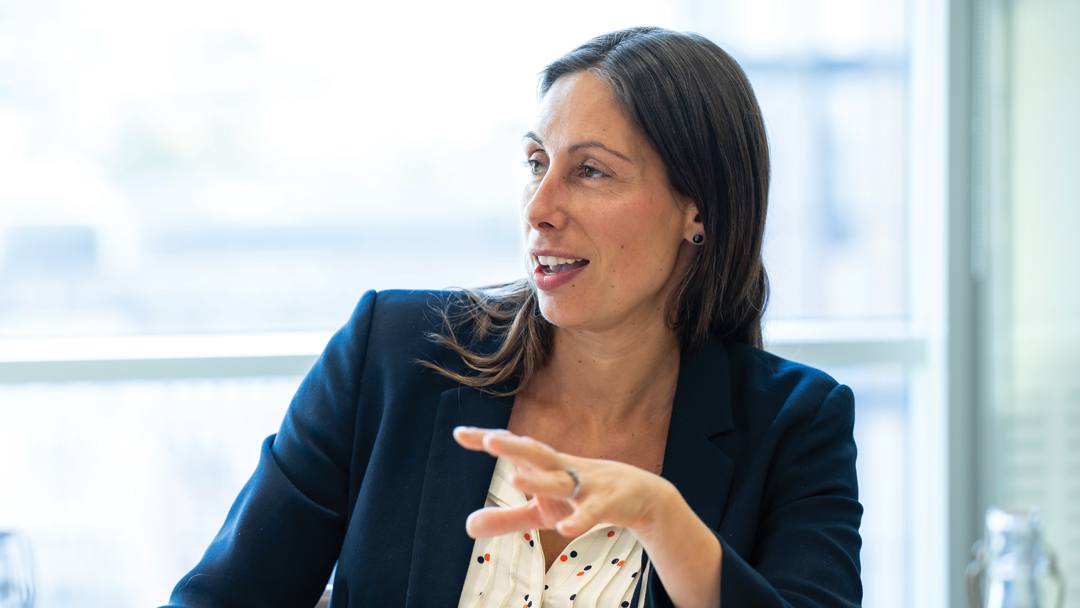Nathalie Tidman, The In-House Lawyer and Legal Business: How much access do you have to the board? How intrinsic are you to the decision-making processes of your business?
Aurea Garrido, Warner Bros. Discovery News & Sports: My team sits with the business. For me, a decisive factor was being part of the executive committee, which I have been for three or four years now. I needed to be part of something; not just advising on technical legal issues. Not everyone is as lucky. I know lawyers who have more senior positions than me in the same industry who don’t get access to the exec team or the board.
Natasha Doulia, KPMG: In the UK, legal does attend board meetings, but in some places around EMEA it’s quite difficult. There’s a long way to go on that. When something bad happens they then realise that legal really does need to be involved and does need a seat at the table. Legal can help with revenue, but also help protect the firm so that it’s not paying out lots of money in litigation.
Lucia Guijarro, Honeywell: Honeywell is a very large corporation, and each business unit has its own legal department. We work together with the business and other functions – compliance, corporate, finance, treasury, etc. We always have a seat at the table at the business unit level and always try to find solutions. Once you make them your allies, it works very well.
Anushka Herath, HSBC Innovation Banking: You want to feel like the business thinks that you are as invested in the success of the company as they are. You can’t just stay in your lane and say, ‘this is the legal question, and I am going to answer it’. More often than not, you’re part of a broader conversation as to what should happen. It’s a much more rewarding role if you can achieve that.
Amelia Senior, Financial Times: Being intertwined with the business lets us give better legal advice. Being in those meetings and sparking their interest and asking them to explain to me how things work, I understand what they’re trying to do. I ask questions that I wouldn’t have asked had I not got that extra detail, which means I can be a better adviser.
Nathalie Tidman: What are the hot topics with ExCo and the board?
Natasha Doulia: Whether you can use ChatGPT is a big one for companies. How do you protect the business from using it as well, especially if you produce client deliverables? Data is a hot topic generally. We have so much data. What do we do with it? Is it something that we can use?
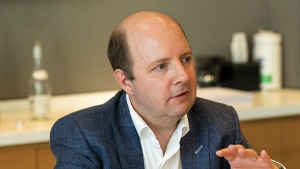
Joy Van Cooten, ACI Worldwide: My company has blocked ChatGPT on all laptops. It is a major concern; we are a software company and if someone accidentally uploaded our code to ChatGPT, that would be detrimental to the company. Once it’s out there, the genie is out of the bottle and it’s impossible to put it back in again.
Natasha Doulia: The use of AI is constantly under review. We’re currently saying in some parts of the business you can use ChatGPT, but just for research purposes. You can’t put anything client-related into it and you can’t use it for a client service or deliverable in case it’s wrong or doctored in some way.
Matthew Kay, Pinsent Masons Vario: We have the challenge of not only trying to work out the impact of AI on the business of law, we must also advise on its impact for clients’ businesses. We must run fast enough, not only to get on top of it as a business, but to be able to advise on it.
Amelia Senior: There’s real discussion at the board at the moment about getting a policy in place around ChatGPT. We want to be able to use it because everyone is using it and it is incredible. If we can benefit from that in some way, that is brilliant. We need to use it within a defined remit, and the challenge at the moment is defining exactly what those parameters should be.
David Halliwell, Pinsent Masons Vario: I heard one GC say that their ambition was that ChatGPT would replace all legal work up to associate level.
Aurea Garrido: That is not going to happen.
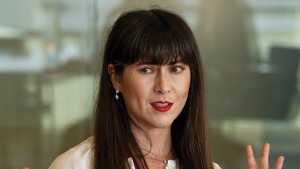
Lucia Guijarro: For very basic research, yes. For decision-making? Definitely not.
Terie Liu, Shiva Hotels: There are also other products. ChatGPT is the current model of AI, but in terms of other products and sharing of data, it’s been quite interesting to see how that is going to evolve. For us at Shiva, it’s more about customer information or client information. We deal with a lot of partnerships with other people. How do we share that information with others? Is that our information? Is that their information? Who has the responsibility if there’s a leak?
Joy Van Cooten: Cyber is definitely a big issue for us, because we deal with lots of personal data for fraud screening. We can have tens of thousands of attacks a day with people trying to get that information. It’s very much a concern of the company that someone using ChatGPT or some other form of AI could open a back door into our systems. At the moment, it’s very much shut down, and everyone is analysing how it can be used to the advantage of the company, while still protecting our customers’ data.
Nathalie Tidman: How much substance is there around ESG concerns in the business?
Lucia Guijarro: ESG is huge right now. It used to be a sub-function, and now there are general counsel for ESG. As part of our digital transformation directive, we developed an ESG app. Every single proposal including ESG claims when we are bidding for business has to be vetted to avoid misrepresentations. We have relied heavily on external counsel for certain aspects of ESG because there isn’t anyone with 20 years of experience in ESG matters. That person does not exist.
Natasha Doulia: It’s crazy the number of companies that have started to come to us to help them with their ESG reporting and strategy. They are now coming to us more due to the disclosures required by the impending CSRD legislation. The audit division is likely to add the assurance services about whether they are meeting ESG targets, and that’s just in Europe. Then similar legislation will probably come out in the US. Companies are not equipped to deal with it. They don’t have the data in terms of reporting. It is a huge opportunity for all of us to help the business and we as good corporate citizens, also as a client or a supplier, have to put ESG targets on ourselves and deliver against those
targets.
David Halliwell: We have heard of some general counsel who have been asked by the board to be effectively the conscience of the business in relation to ESG. Do any of your legal teams have that sort of role?
Anushka Herath: It’s interesting to think about where ESG sits. You mentioned this GC has been asked to step up as a conscience of the company. I wonder if it’s because nobody else quite wants it. It isn’t quite finance. It isn’t quite risk. Is it marketing, because it’s all about your brand and how you show up externally? There’s a legal and a regulatory element to it. It’s such a cross-functional area. It’s hugely the priority for the banking industry. I don’t think I would necessarily want for legal’s only role to be the conscience. It’s quite limiting.

Terie Liu: I don’t think it’s incumbent on one person or even just the legal team, because I think that might be quite hard. It also depends on who you have in that role, because obviously everyone’s ethics and decisions and values are different, and even their view on where the business should go. For us it’s easier because it’s a family-owned business. We don’t have multiple shareholders to report to. It’s very much down to one person. A lot of the time, it’s ultimately his decisions as to where he wants the business to go. If his and the views of the GC or another senior member of leadership don’t align, then the CEO makes the final call. A lot of the time, it could be seen as, ‘No. You cannot do that’, but the business sees this as we are taking business risk. So, it also depends on the organisation you work for.
Colin Fowler, Church & Dwight: I’m not comfortable with the GC being the sole course corrector or the conscience. It’s a CEO thing. A board decision is made. The CEO is given the task of implementing it, and the GC and the other functions will comment, course correct and do their bit. I don’t think it’s right that the GC is the only person who is steering the ship because keeping the correct course is so pervasive and has such big implications for the business. The GC certainly has a safety-net function.
Aurea Garrido: What we have at the moment is an ethics and compliance team, but it is a legal team dedicated only to that. I wouldn’t want to touch that. The lawyers are trained in that and it is their area of the business, but it is their only area of the business. The ethics team is a legal team. They are completely
separate.
David Halliwell: How many of you have legal ops functions?
Aurea Garrido: We have it.
Natasha Doulia: We do but not enough. In the future, we’re going to have more.
Terie Liu: It was not a thing five years ago.
Alexandra Morris, Pinsent Masons Vario: There are adverts for jobs asking for a legal ops person with ten years’ experience.
Colin Fowler: We have a legal ops function, but it is more doing the billing, forecasting, document management and all that kind of thing. Full-blown CLM we’re not doing yet.
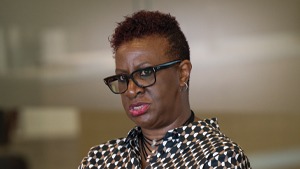
Joy Van Cooten: What I have found is that legal ops in the UK and legal ops in the US are different. My title was head of legal operations – EMEA and everyone thought my function was legal ops, but I was actually just head of legal – EMEA.
Aurea Garrido: My legal ops here in London is someone legally trained that I can give a precedent and say, ‘Transfer me that into something that could generate contracts.’ I decide with her what needs approval. For example, if you change an entry, you need approval from legal, but if you change only the date or the fees, you do not. Also how does it go to signature, all of that. That person does all of that and it is truly quite a lot of work.
Anushka Herath: Why do you have headcount insourced for that? Does it work better to have someone in the team full-time working on that rather than externally partnering with some kind of alternative, like managed services?
Colin Fowler: They really need to know how it all works, what the business is about and who the teams are. You would have to have someone external sitting in the business for a significant time before they were remotely ready.
Natasha Doulia: They can also look at your efficiencies, what you can automate and what you can’t. That’s a full-time job. In my opinion legal teams may end up with fewer lawyers and more tech people. To be honest, I am not a tech person, but I can sure as hell do training, or at least someone that I can ask who understands it and maybe can explain it to me in layman’s terms.
Nathalie Tidman: There is this fear that technology will replace people up to a certain skill level. Is that a real pressure?
Terie Liu: Not yet for me. In private practice, I always found it easier to work with partners who were really experienced and hands on. You had the other partners who left you to do whatever, and you just sink or swim without that progression. In-house, it’s more about specialising. There are things you just do not know about until you go into the business and understand what they do. Previously, for me anyway, you sat in an office, and you pumped out documents, but you didn’t know the nuances of X, Y and Z. It isn’t just legal training; it isn’t just ops training. It’s getting that holistic view, sitting in the business.
David Halliwell: I have never heard of a point in the financial cycle when legal was not under budgetary pressure. There’s always pressure to cut costs. Presumably that’s a constant.
Joy Van Cooten: It is a constant.
Colin Fowler: It is. I find it quite a difficult conversation to have. It’s not as though this is the first time we’ve heard this. We’re many years into this. Corporate deals were supposed to be completely different by now. 50% or 80% of it was supposed to be done by AI. It wasn’t done that way in the last deal I was on. AI still played a fairly small part.
However, you don’t want to come across as a luddite. Fortunately, immediately before entering FMCG, I was in the tech industry, and before that I was an IP/technology lawyer. I can say, ‘Look, I’m not a luddite. I get it.’ We thought we’d be miles down the road by now, and we aren’t there yet. ChatGPT might be able to write you the most amazing proposal, or whatever it is, but we’re probably not where you think we’re at in terms of replacing specialised legal headcount just yet. We still need the headcount in order to succeed.
Aurea Garrido: Yes, the headcount thing is so difficult. If anything, it’s more difficult than it was ten years ago.

David Halliwell: Have you looked at different resourcing models? We’re hearing of big corporates who are starting to build their own captive LPOs because they might not necessarily have had a good experience with a third-party LPO and they quite often have large service centres that are doing everything but legal. They are now starting to build the legal elements of that, particularly in India. Is that something any of your businesses are looking at?
Lucia Guijarro: Yes, it is things like service centre workers. They’re not properly employees. They do NDAs based on templates and stuff like that.
Aurea Garrido: No, we don’t have that in legal. I’ve seen that in other areas of the business, like in finance and IT but I don’t think it’s happening yet.
David Halliwell: Legal seems to be last in the queue because it’s all too difficult.
Anushka Herath: I think legal is the best at persuading the business why it shouldn’t be.
Nathalie Tidman: Is it still an attractive prospect to be a GC? Do people in your group of friends and colleagues still aspire to it as a lifestyle?
Anushka Herath: Yes, that desire is still there. The partnership route has lost a bit of the shine it had maybe ten years ago. In-house GC roles still have that kudos.
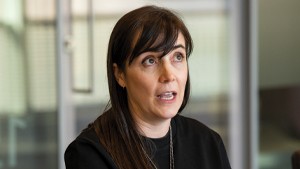
Aurea Garrido: When you’re talking about a big company like mine, you need to define ‘GC’. What do you mean by that? There are so many different divisions and so many different teams. Only a handful of people in a legal team of such a large company have the GC title. It’s about the size of the team you want to run. Are you happy with a small team or do you want a bigger team? For me at the moment, yes, I definitely want to run a team, whatever title they give me, AGC or whatever it is.
Natasha Doulia: I agree with you. I still aspire to GC, but what does it mean? I always thought I did want to become GC. Maybe since Covid –I’ve questioned it. There’s a lot more pressure. I can still get the things I like out of the job and I can still get board and ExCo exposure without having to do that. Is it worth it or not?
Joy Van Cooten: The higher you climb, the less legal work you do. It’s about getting that balance. The amount of day-to-day legal work I do is shrinking.
Colin Fowler: Our GC is a career New York corporate lawyer. We need to do SEC filings, on which so much depends, and which need to be right every time. Some companies view having listed company experience in the jurisdiction where the company is headquartered as very important, and that can present a challenge to those from elsewhere. Aside from the global CLO/GC job, if you have regional responsibility and you’re part of an executive team, it depends how much autonomy you have. Okay, you’re not at the absolute top table, but you are at the regional top table. If you have a good degree of autonomy and if you work with some nice people and all the rest of it, then that can be a rewarding place to be.
The panellists
- Nathalie Tidman Editor, The In-House Lawyer and Legal Business
- Natasha Doulia, KPMG
- Colin Fowler, Church & Dwight
- Aurea Garrido, Warner Bros. Discovery News & Sports
- Lucia Guijarro, Honeywell
- David Halliwell, Pinsent Masons Vario
- Anushka Herath, HSBC Innovation Banking
- Matthew Kay, Pinsent Masons Vario
- Terie Liu, Shiva Hotels
- Alexandra Morris, Pinsent Masons Vario
- Amelia Senior, Financial Times
- Joy Van Cooten, ACI Worldwide


